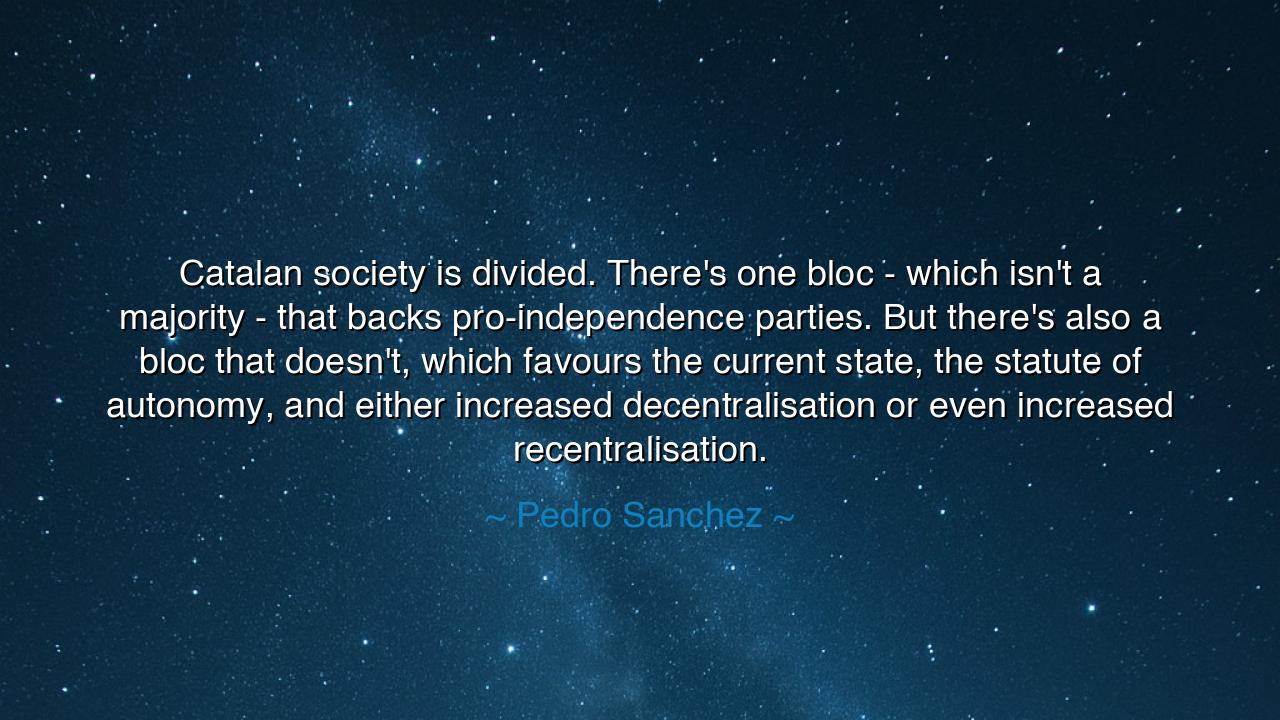
Catalan society is divided. There's one bloc - which isn't a
Catalan society is divided. There's one bloc - which isn't a majority - that backs pro-independence parties. But there's also a bloc that doesn't, which favours the current state, the statute of autonomy, and either increased decentralisation or even increased recentralisation.






The words of Pedro Sánchez—“Catalan society is divided. There's one bloc - which isn't a majority - that backs pro-independence parties. But there's also a bloc that doesn't, which favours the current state, the statute of autonomy, and either increased decentralisation or even increased recentralisation.”—are not the idle musings of a statesman, but the sober recognition of a wound within a nation. Here he speaks of division, that most ancient of human afflictions, which weakens kingdoms and sunders peoples. Catalonia, with its proud history, culture, and language, stands at a crossroads where two visions of destiny contend: one of independence, the other of unity. And Sánchez reminds us that neither bloc alone holds all hearts, that society itself is fractured, with no single will commanding all.
The ancients knew that such divisions are the most perilous. Civil strife is more dangerous than war with an outside foe, for it turns brother against brother, neighbor against neighbor, and the hearth into a battlefield. Rome itself fell not only by the swords of barbarians but by the erosion of unity within. In Sánchez’s words we hear the echo of that same peril: when a people are divided in vision, the soul of the nation trembles. For the independence of Catalonia is not merely a question of borders or statutes—it is a question of belonging, of identity, of what it means to be a people.
History offers a mirror in the tale of Scotland. There too, the land was divided between those who longed to stand apart as an independent nation, and those who wished to remain within the United Kingdom, though perhaps with greater autonomy. The 2014 referendum revealed that the nation itself was split, nearly down the middle. Families were divided in allegiance, yet bound in love. The lesson is clear: when blocs within a society stand opposed, the challenge is not only political, but profoundly human. How does one forge unity when the very heart of the people beats in two different rhythms?
Sánchez’s words also remind us of the shades of loyalty within Catalonia. It is not simply independence versus unity, but a spectrum: some long for full separation, others for more decentralisation, and still others for a stronger central hand. Thus, the conflict is not a clash of two monoliths, but a many-layered struggle of visions. This is why he says society is divided—not into black and white, but into a mosaic of hopes and fears. In this lies both danger and opportunity. Danger, because complexity can breed confusion. Opportunity, because where there are shades, there may also be compromise.
Yet let us not forget: division is not destiny. The ancients also taught that wise leadership can heal rifts. When Abraham Lincoln faced a nation torn in two, he spoke not of vengeance but of binding up the nation’s wounds. And though war consumed America, his words laid the path for reconciliation. If Catalonia and Spain are to walk forward, leaders must speak not only to blocs, but to the shared humanity that lies beneath. For no society can endure when half feels silenced, and no state can flourish when its people cease to see one another as kin.
The lesson for us is clear: unity must be sought, even when agreement cannot be found. To disagree is human, but to divide beyond repair is ruinous. In every society there will be blocs, factions, visions. The duty of leaders and citizens alike is to hold fast to what binds them together, lest difference grow into enmity. For if one bloc wins by crushing the other, then victory itself becomes defeat, and freedom is lost in bitterness.
Practically, this means fostering dialogue, not silence; compromise, not stubbornness; respect, not scorn. The pro-independence voice must be heard without fear, and the voice of unity must be honored without contempt. Only when both blocs feel that they belong to the same conversation can the fracture begin to heal. And citizens, too, must practice this on the small scale: in families, workplaces, neighborhoods. For every act of listening is a stone laid in the bridge of unity.
Thus, Sánchez’s words stand as both warning and counsel: Catalan society is divided. Yet division need not be permanent, if wisdom prevails. Let us learn from history that nations which endure are those that find balance amid discord, and that the highest duty of both rulers and ruled is not only to pursue their own vision, but to preserve the bonds that make them one people. For a society may differ in path, but if it forgets its shared destiny, it will perish. Better, then, to argue as a family than to sever as strangers.






AAdministratorAdministrator
Welcome, honored guests. Please leave a comment, we will respond soon